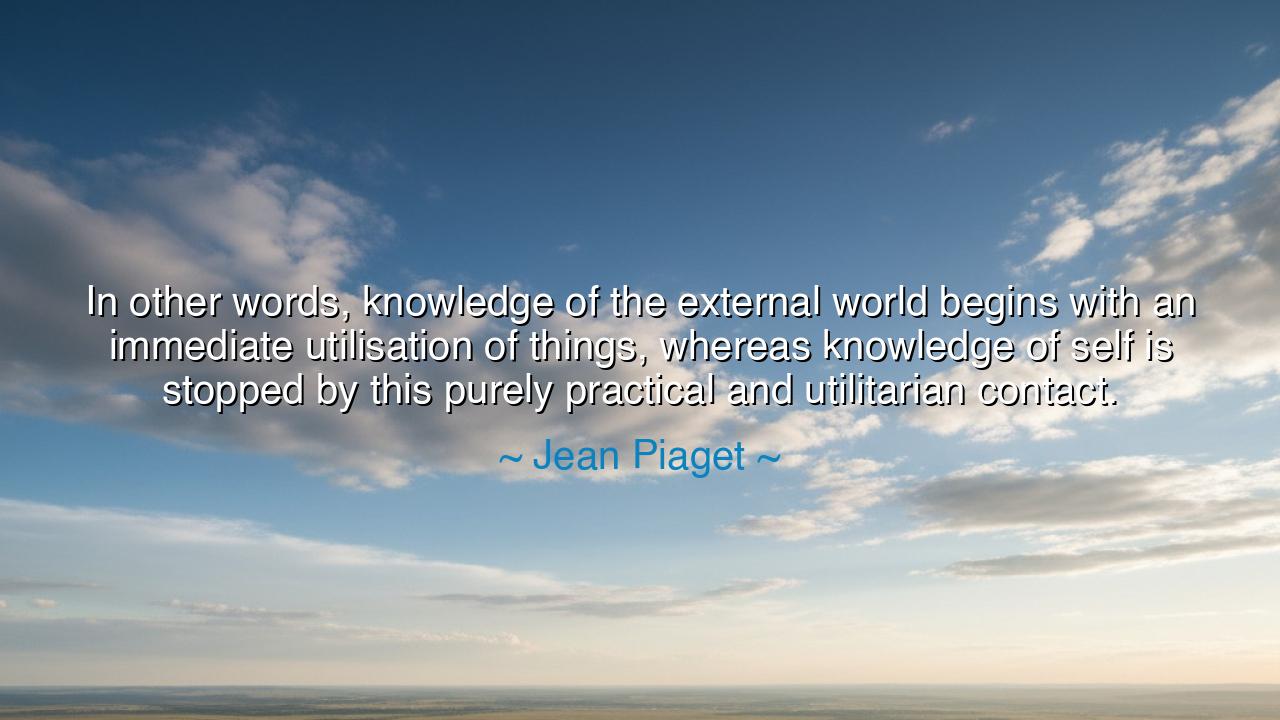
In other words, knowledge of the external world begins with an
In other words, knowledge of the external world begins with an immediate utilisation of things, whereas knowledge of self is stopped by this purely practical and utilitarian contact.






The philosopher of childhood and learning, Jean Piaget, declared: “In other words, knowledge of the external world begins with an immediate utilisation of things, whereas knowledge of self is stopped by this purely practical and utilitarian contact.” In these words lies a profound meditation on the difference between what we know of the world outside us, and what we understand of the world within. For Piaget, to grasp a stone, to taste fruit, to build with wood—this is how our knowledge of the external world begins: through touch, through action, through use. But to know oneself—this is another matter. The tools of utility do not suffice. To understand the self requires reflection, patience, and stepping beyond the immediate demands of survival.
The ancients would nod at this truth. For the child first learns not by philosophy, but by reaching, grasping, and experimenting with the things of the earth. In this way, the mind awakens to the reality of the external world. Yet the same methods that allow us to conquer and use nature do not reveal the secrets of the soul. To treat the self merely as a tool is to miss its essence. Self-knowledge cannot be seized as one seizes bread, nor hammered as one hammers iron. It requires silence, contemplation, and a turning inward that utility cannot provide.
Consider the story of Diogenes the Cynic, who mocked men for knowing the measurements of the heavens but not their own desires. He lived in poverty, holding a lantern in daylight, declaring he searched for an honest man. In his strange way, he echoed Piaget’s truth: we know how to use the world, but we often fail to know ourselves. We harness rivers, tame beasts, invent machines, and yet remain strangers to our own hearts. Our utilitarian contact with things feeds us and clothes us, but it blinds us if we believe that mastery of the external is mastery of the soul.
The history of nations shows this as well. The mighty empire of Rome mastered engineering, roads, aqueducts, and war. Their knowledge of the external world—its conquest and its use—was unmatched. Yet within, corruption spread. Citizens knew how to exploit the world but not themselves, and so Rome collapsed not by the assault of enemies alone, but by its own ignorance of inner virtue. Piaget’s insight whispers here: practical mastery without self-understanding leads to downfall.
The meaning, then, is that man’s first steps in learning are practical, but the higher calling is reflective. To live only in the utilitarian realm is to remain a craftsman of things but a stranger to one’s own soul. The external can be known by use, but the internal must be known by wisdom. Knowledge of self is not gained by tools, but by truth. It begins when one dares to ask: “Who am I beyond my labors? What do I seek beyond my needs? What does my life mean beyond its utility?”
The lesson for us is profound: do not stop at practical knowledge alone. Yes, learn to master your trade, to earn your bread, to navigate the world of things. But go further. Seek to understand your mind, your heart, your spirit. Ask why you desire what you desire. Examine your failures, not only to repair them, but to know their roots. To neglect self-knowledge is to build a house strong in walls but empty in foundation.
Practical action can be simple but transformative: make time each day to reflect, apart from labor. Journal your thoughts, your fears, your motives. Read not only for skill but for wisdom. Engage in conversation not only to persuade, but to understand. Let silence teach you, as much as action. And remember: to know the external world is to live; to know the self is to live wisely.
Thus Piaget’s words endure as a compass for all generations: our first contact with the world is through utilisation, but true knowledge of self requires us to rise beyond the practical into the reflective. To neglect the former is to starve; to neglect the latter is to wander without purpose. Strive, then, for both—master of the external, and student of the internal—that you may walk as a whole being, strong in body, clear in mind, and deep in soul.






AAdministratorAdministrator
Welcome, honored guests. Please leave a comment, we will respond soon